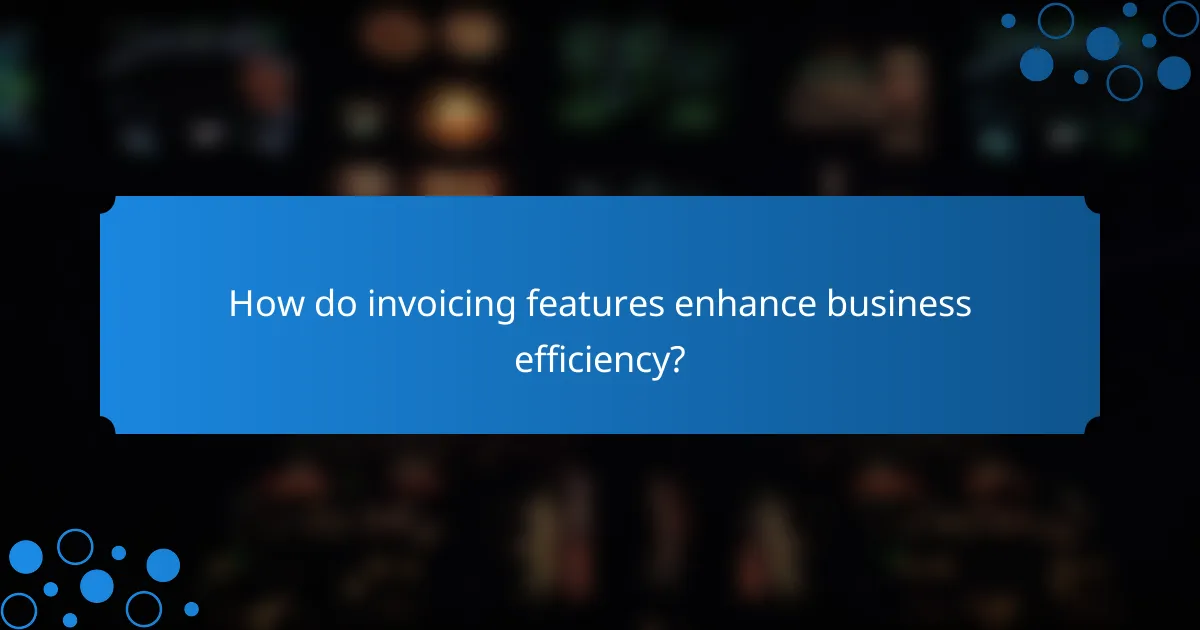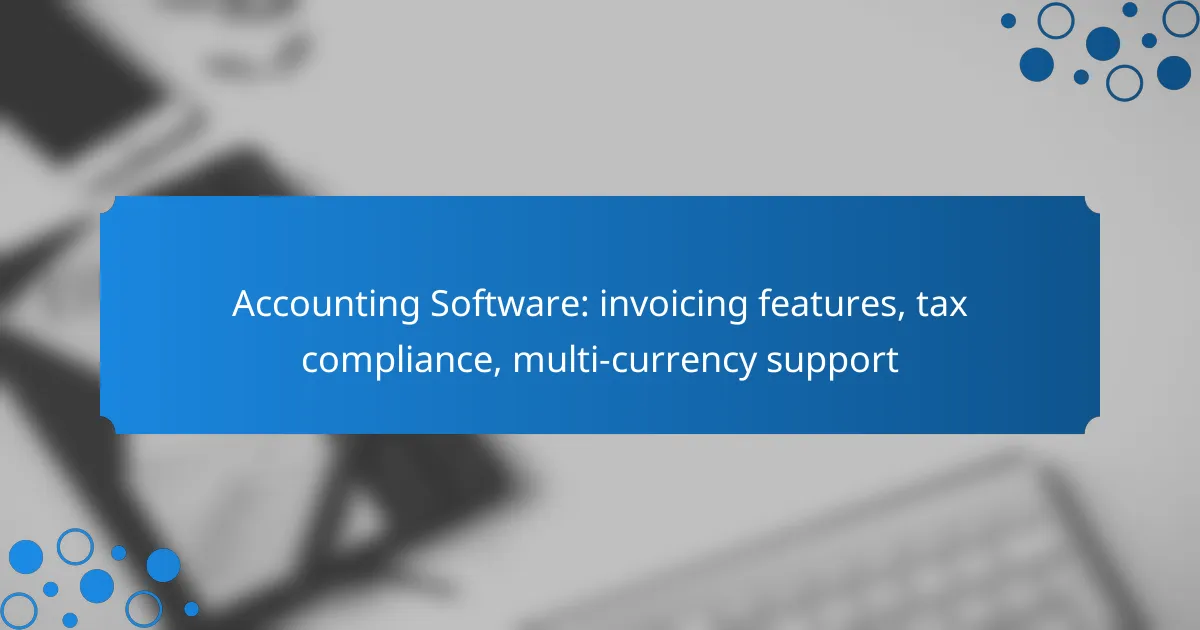Accounting software with advanced invoicing features is essential for businesses in the UK, offering tools that ensure compliance with regulations while supporting multi-currency transactions. These platforms automate tax calculations and reporting, helping businesses adhere to HMRC requirements and minimize errors. Additionally, multi-currency support facilitates seamless international transactions, enhancing invoicing and payment processes while maintaining compliance with local tax laws.

What are the best accounting software for invoicing features in the UK?
The best accounting software for invoicing features in the UK includes Xero, QuickBooks, and FreshBooks. These platforms offer robust invoicing capabilities tailored to meet the needs of businesses, ensuring compliance with UK regulations and supporting multi-currency transactions.
Xero invoicing capabilities
Xero provides a comprehensive invoicing system that allows users to create and customize invoices easily. You can automate recurring invoices, set payment reminders, and accept online payments, which streamlines cash flow management.
Additionally, Xero supports multi-currency invoicing, making it suitable for businesses dealing with international clients. The platform automatically converts currencies based on current exchange rates, ensuring accurate billing.
QuickBooks invoicing features
QuickBooks offers a user-friendly invoicing feature that enables businesses to generate professional invoices quickly. Users can customize templates, add logos, and track invoice status in real-time, which enhances transparency and efficiency.
Moreover, QuickBooks integrates seamlessly with various payment gateways, allowing clients to pay directly from the invoice. This feature can significantly reduce the time it takes to receive payments and improve overall cash flow.
FreshBooks invoicing options
FreshBooks is known for its intuitive invoicing options, which include customizable templates and automated billing. Users can set up recurring invoices and late payment reminders, helping to maintain timely payments from clients.
FreshBooks also supports multi-currency transactions, allowing businesses to invoice clients in their preferred currency. This flexibility is particularly beneficial for freelancers and small businesses with a diverse client base.

How do accounting software handle tax compliance in the UK?
Accounting software in the UK manage tax compliance by automating calculations, generating reports, and ensuring adherence to HMRC regulations. These tools help businesses accurately calculate VAT and other taxes, reducing the risk of errors and penalties.
Tax calculation in Xero
Xero simplifies tax calculation by automatically applying the correct VAT rates based on the type of transaction. Users can set up different tax rates for various goods and services, ensuring compliance with UK tax laws.
The software generates VAT returns that can be submitted directly to HMRC, streamlining the filing process. This feature helps businesses save time and maintain accurate records for audits.
QuickBooks tax compliance tools
QuickBooks offers robust tax compliance tools that automatically calculate VAT and generate necessary reports. Users can categorize transactions to ensure the correct tax treatment, which helps in maintaining compliance with UK regulations.
Additionally, QuickBooks provides reminders for tax deadlines and allows users to file VAT returns electronically. This functionality minimizes the risk of late submissions and potential fines, making tax management more efficient.

What is the importance of multi-currency support in accounting software?
Multi-currency support in accounting software is crucial for businesses operating internationally, as it enables them to manage transactions in various currencies seamlessly. This feature simplifies invoicing, payment processing, and financial reporting, ensuring compliance with local tax regulations and reducing the risk of currency conversion errors.
Multi-currency features in Xero
Xero offers robust multi-currency capabilities that allow users to send invoices and receive payments in multiple currencies. When a transaction occurs in a foreign currency, Xero automatically converts the amount to the base currency using real-time exchange rates, which helps maintain accurate financial records.
Additionally, Xero provides users with the ability to manage foreign currency accounts, track gains and losses from currency fluctuations, and generate reports that reflect the impact of these transactions on overall financial performance. This feature is particularly beneficial for businesses that frequently deal with international clients or suppliers.
Multi-currency options in QuickBooks
QuickBooks also supports multi-currency transactions, allowing businesses to invoice customers and pay vendors in their preferred currencies. Users can enable this feature in their account settings, after which they can select the currency for each transaction, making it easier to manage diverse financial interactions.
QuickBooks automatically updates exchange rates, ensuring that all transactions are accurately converted to the home currency. However, businesses should be aware that enabling multi-currency support may involve additional fees and complexities in managing foreign currency accounts, so it’s essential to weigh these factors before implementation.

What criteria should you consider when selecting accounting software?
When selecting accounting software, consider features like invoicing capabilities, tax compliance, and multi-currency support. These elements are crucial for ensuring efficient financial management and meeting regulatory requirements.
Integration capabilities
Integration capabilities refer to how well the accounting software connects with other tools and platforms, such as payment processors, CRM systems, and e-commerce sites. A robust integration can streamline workflows and reduce manual data entry, saving time and minimizing errors.
Look for software that offers APIs or pre-built integrations with popular applications. For example, if your business uses PayPal or Stripe for payments, ensure the accounting software can easily sync transactions from these platforms.
Pricing plans comparison
Pricing plans for accounting software can vary widely, typically ranging from free basic versions to comprehensive packages costing hundreds of dollars per month. Evaluate what features are included in each tier and whether they align with your business needs.
Common pricing structures include monthly subscriptions, annual fees, or one-time purchases. Consider starting with a trial version to assess functionality before committing to a paid plan. Be cautious of hidden fees for additional features like multi-currency support or advanced reporting tools.

How do invoicing features enhance business efficiency?
Invoicing features streamline the billing process, reducing manual errors and saving time. By automating invoicing tasks, businesses can focus on core operations while ensuring timely payments and improved cash flow.
Automated invoicing benefits
Automated invoicing eliminates the need for manual entry, significantly reducing the time spent on billing. This feature allows businesses to generate and send invoices quickly, often within minutes, which can lead to faster payment cycles.
Additionally, automated reminders can be set up to notify clients of upcoming or overdue payments. This proactive approach can enhance cash flow and minimize late payments, ultimately improving financial stability.
Customizable invoice templates
Customizable invoice templates enable businesses to create professional-looking invoices that reflect their brand identity. Companies can adjust colors, logos, and layouts to ensure consistency with their overall marketing materials.
These templates often include fields for essential information, such as item descriptions, quantities, and pricing. By tailoring invoices to meet specific business needs, companies can enhance clarity and professionalism, leading to better client relationships.

What are the challenges of tax compliance in accounting software?
Tax compliance in accounting software involves ensuring that all financial transactions adhere to local tax laws and regulations. This can be challenging due to the complexity of tax codes, frequent updates, and the need for accurate reporting across different jurisdictions.
Common pitfalls in tax reporting
One common pitfall in tax reporting is the misclassification of expenses, which can lead to incorrect deductions and potential audits. Users often overlook specific tax codes applicable to their industry, resulting in non-compliance.
Another issue is failing to keep up with changes in tax regulations, which can vary significantly by region. For instance, businesses operating in multiple states in the U.S. must navigate different sales tax rates and rules, complicating their reporting process.
Software limitations in tax updates
Many accounting software solutions struggle to provide timely updates for tax regulations, which can leave users exposed to compliance risks. Some software may not automatically adjust tax rates or rules, requiring manual intervention that can lead to errors.
Additionally, not all accounting software supports multi-currency transactions, which can complicate tax reporting for businesses operating internationally. Users must ensure their software can handle various currencies and corresponding tax implications to avoid discrepancies in their financial reports.

How does multi-currency support affect international transactions?
Multi-currency support simplifies international transactions by allowing businesses to invoice clients in their preferred currency, reducing conversion errors and enhancing customer satisfaction. This feature is crucial for managing exchange rates and transaction fees effectively.
Exchange rate management
Effective exchange rate management is vital for businesses dealing with multiple currencies. Accounting software often provides real-time exchange rates, allowing users to set rates for transactions based on current market conditions. This helps in minimizing losses due to fluctuating rates.
For example, if a company in the US invoices a client in Europe, it can set the invoice amount in euros based on the current USD to EUR exchange rate. This ensures that the amount received aligns closely with the intended value, protecting against currency fluctuations.
Transaction fees considerations
Transaction fees can significantly impact the cost of international transactions. When using multi-currency support, businesses should be aware of potential fees charged by banks or payment processors for currency conversion. These fees can vary widely, often ranging from 1% to 3% of the transaction amount.
To minimize costs, businesses should compare different payment processors and their fee structures. Some may offer more favorable rates for specific currencies, while others may charge flat fees regardless of the transaction size. It’s advisable to choose a processor that aligns with the most common currencies used in your transactions.

What are emerging trends in accounting software for 2024?
In 2024, accounting software is increasingly focusing on automation, enhanced tax compliance, and multi-currency support. These trends are driven by the need for efficiency, accuracy, and global business operations.
Invoicing features
Modern accounting software is prioritizing customizable invoicing features that allow businesses to create professional invoices quickly. Users can often choose from various templates, add their branding, and automate recurring invoices to save time.
Additionally, features like invoice tracking and reminders help ensure timely payments. Integrating payment gateways can further streamline the process, enabling clients to pay directly from the invoice.
Tax compliance
Tax compliance is becoming more sophisticated in accounting software, with tools designed to automatically calculate and apply the correct tax rates based on location. This is crucial for businesses operating in multiple jurisdictions, as tax laws can vary significantly.
Many software solutions now offer real-time updates on tax regulations, helping users stay compliant with local laws. This reduces the risk of penalties and simplifies the filing process, making it easier for businesses to manage their tax obligations.
Multi-currency support
As businesses expand globally, multi-currency support in accounting software is essential. This feature allows users to conduct transactions in various currencies, automatically converting amounts based on current exchange rates.
Effective multi-currency tools also help manage foreign exchange risks and simplify financial reporting. Users should look for software that provides real-time exchange rate updates and easy reconciliation of multi-currency transactions to ensure accuracy.
